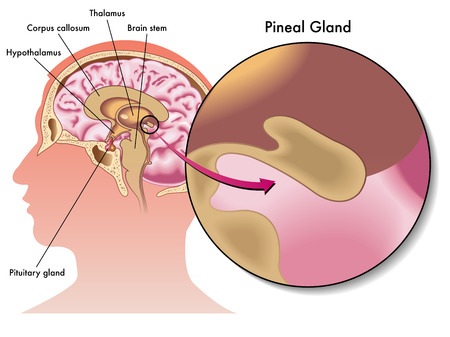Melatonin
Melatonin is the prototypical chronobiotic. Melatonin is used as a chronobiotic to realign the body’s circadian rhythm, but has a narrow window of time when it should be taken; if it is not taken at the correct time, the sleep/wake problem will become even worse. The most effective time to take melatonin is either at dusk or dawn; depending upon when you want to sleep.
Melatonin is sold over the counter in the United States. Most European countries make it a prescription drug, and the European Medicines Agency has approved a slow release preparation sold under the brand name Circadian. Science has found two roles for melatonin in humans: the involvement of nocturnal melatonin secretion in initiating and maintaining sleep, and control by the day/night melatonin rhythm of the timing of other 24-hour rhythms.
Melatonin protects the brain’s neurons, and is effective in preventing the progression of cognitive dysfunction in people with Alzheimer’s disease. Melatonin also helps to reduce "sundowning," where people affected with Alzheimer’s do not sleep at night due to circadian rhythm disruption. It is estimated that 45% of Alzheimer’s patients suffer sundowning or other sleep disorders. When melatonin is given to people following traumatic brain injury,, the amount of brain damage is decreased, along with a reduction in inflammation and the number of infections. At the cellular level, the hormone appears to induce mRNA levels of several antioxidant enzymes. Melatonin increases the effectiveness of the drugs used to treat traumatic brain injury while also decreasing the drugs’ toxic effects. Chemically, melatonin can be classified as a methoxyindole. The formal chemical name is N-acetyl-5-methoxytryptamine.
 Melatonin acts as a sedative and chronobiotic; it lowers anxiety, decreases pain, prevents inflammation, and has antioxidant effects. Alterations in normal levels can lead to the development of mood and behavioral disorders, and can also affect body weight. People with severe depression often have reduced melatonin levels, an unsynchronized circadian rhythm and severe sleep disturbance.
Melatonin acts as a sedative and chronobiotic; it lowers anxiety, decreases pain, prevents inflammation, and has antioxidant effects. Alterations in normal levels can lead to the development of mood and behavioral disorders, and can also affect body weight. People with severe depression often have reduced melatonin levels, an unsynchronized circadian rhythm and severe sleep disturbance.
Melatonin is also secreted by other tissues and organs in the body; this melatonin acts as an antioxidant, scavenging free-radicals and decreasing the risk for the development of cancer. Melatonin is necessary for normal bone health and immune function, and detoxifies potentially harmful chemicals. Melatonin also enhances the action of other drugs or hormones in the body.
When used as a treatment for chronic fatigue syndrome, melatonin improves motivation, activity, and concentration and has been found to reduce fatigue levels. Melatonin levels normally decrease with age, which results in diminishment of circadian rhythm amplitudes. Sleep fragmentation in the elderly can be successfully treated with melatonin. Why would anyone use melatonin for insomnia when other medicines are available? Different drugs work on different neurotransmitter systems in the brain, so it is good to have options. Some patients find benzodiazepine antagonist drugs to have a paradoxical effect - the drugs make them less likely to sleep. Some with that problem find melatonin to be effective.
Melatonin has no known food interactions, and no known effects on routine diagnostic lab test values for humans.
The typical dosage of 0.5 to 10 mg/day taken at night. Tell your doctors about other medications you take, as there are potential negative interactions. Note that there are concerns about melatonin supplements sold in the US and whether the dosages listed are correct and quality of preparations are adequate.
Some people should not take melatonin; these include children, women who are pregnant or breastfeeding, people who have kidney, liver or heart disease, autoimmune diseases, depression, central nervous system disorders, and Parkinson’s disease. Serious side effects from melatonin have not been reported, but effects from taking melatonin over a long period of time still need to be studied. Melatonin supplements should be used only under your doctor’s supervision.
Melatonin can be found as a dietary supplement in most health food stores, and is supplied as tablets, extended-release capsules, or in an injectable form when used for cancer treatment. Preparations of melatonin are unregulated at this time; amounts are not standardized, and may be contaminated. Research has shown that melatonin can scavenge free radicals, at least in test tubes, and acts as an antioxidant.
Melatonin occurs naturally in some foods, but the amounts are not high enough to influence circadian or circannual rhythm. Serotonin, a neurotransmitter, is the precursor of melatonin, and plays a role in sleep-wake cycle, appetite and gastrointestinal health, mood, depression and obsessive compulsive disorder. There are many foods containing serotonin, but serotonin in food does not cross the blood-brain barrier and is not effective as a chronobiotic in this form.
Treatment of Other Disorders
Melatonin has been found to be of value in the treatment of many diseases and disorders. Cancer patients who receive melatonin during chemotherapy and radiation suffer fewer toxic effects from the treatments. Tests have shown some improvement in survival rates and overall ability to function in people with certain types of cancer. When melatonin is given prior to surgery, anxiety and pain is decreased, especially in the first day following surgery. Melatonin also helps to readjust the sleep-wake cycle, which is commonly disrupted after surgery.
Melatonin is also effective in alleviating some symptoms of fibromyalgia. Melatonin is being tested for cancer prevention, to treat osteoporosis, and to increase the effectiveness of some medical therapies, while decreasing the toxic effects of the drugs. Scientific research is also being done to explore the effectiveness of melatonin in the treatment of headache disorders, especially migraines and cluster headaches. The hormone may also be part of a nervous system mechanism that is involved with the progression of Alzheimer's disease.
Chronobiotics Pharmacokinetics
The Chrconobiotics book is available in Kindle format from Amazon:
 .
.